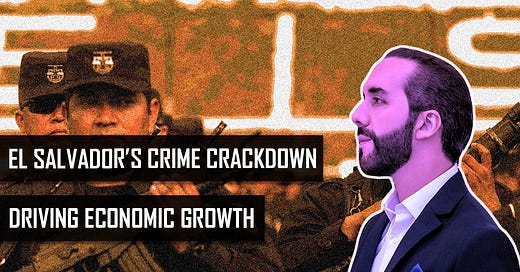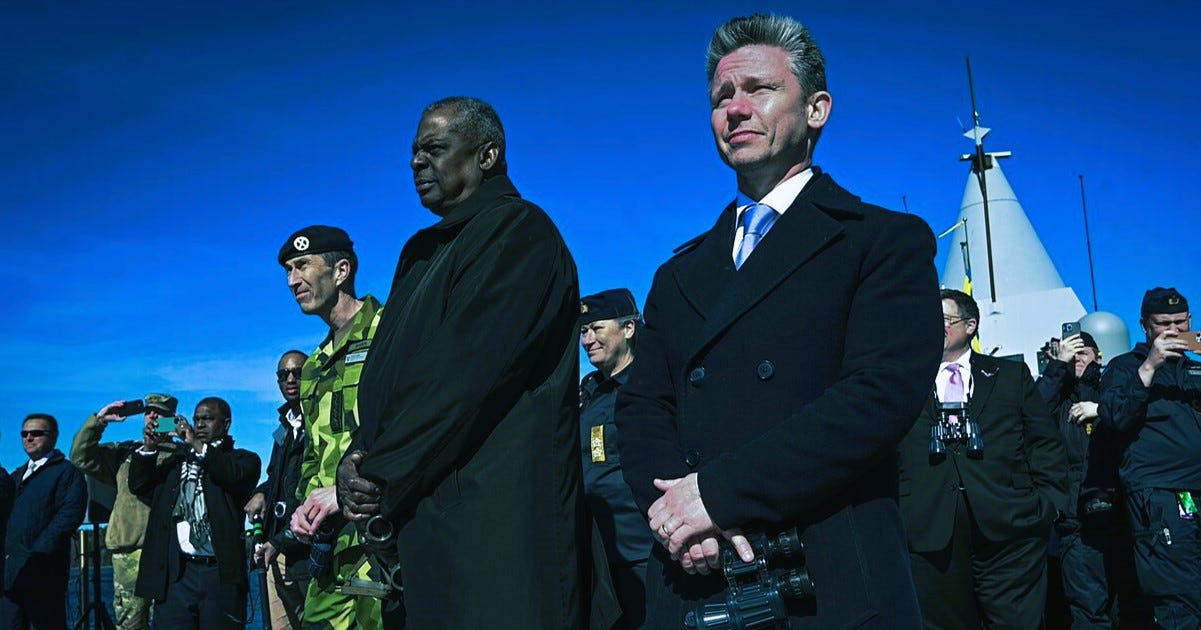#83: BUKELE'S CRIME CRACKDOWN DRIVING EL SALVADOR'S ECONOMIC GROWTH
Hungarian farmers protest in support of gov's ban on Ukrainian grain + Italy to issue decree to expel migrants who pretend to be minors + Sweden calls on support from army during crime crisis + MORE!
PRESIDENT NAYIB BUKELE’S CRIME CRACKDOWN DRIVING EL SALVADOR’S ECONOMY
A recent report from Santander US Capital Markets commends El Salvador's remarkable strides in enhancing security within the country as a key driver of economic growth.
The report, titled “An Alternative Growth Model to Reduce Liquidity/Solvency Risks" found its way to President Nayib Bukele's X account, who shared it along with an assertive, "I told you so."
The Santander report underscores the substantial reduction in El Salvador's homicide rate, now ranking among the lowest in the region.
Statistics revealed in the report demonstrate a considerable decline in homicides, with merely 2.3 per 100,000 inhabitants recorded between January 1st and September 23rd this year, a significant contrast to the alarming figure of 103 per 100,000 in 2015.
The report underscores how these advancements in security have generated favorable outcomes for tourism, foreign investments, and migration trends.
Santander further sheds light on the tourism sector, highlighting the increase in tourist arrivals since 2019. The report draws from a UN survey, revealing that a significant 60% of Salvadorans living in the US harbor intentions of returning to their homeland.
HUNGARIAN FARMERS SUPPORT GOV IN UKRAINIAN GRAIN BAN
The decision by the European Commission to revoke the ban on Ukrainian grain imports has caused a stir among Hungarian farmers, resulting in a protest at the Záhony border crossing of Hungary over the weekend.
These farmers, equipped with their tractors and various tools, converged to obstruct a portion of the road, expressing their solidarity with the Hungarian government's stance against the European Union. Hungary has gone against the EU's stance by extending the ban on Ukrainian grain and other agricultural goods, joining hands with Poland in this regard.
The demonstration, reported by Remix, was orchestrated by the Hungarian Federation of Farmers’ Groups and Agricultural Cooperatives (Magosz) and the National Chamber of Agriculture (NAK). Leaders of these organizations unequivocally criticized the European Union's actions as inappropriate and detrimental to Hungarian agriculture.
Magosz president, István Jakab, did not mince words when he stated, "“They have made a huge mistake by allowing (…) uncontrolled Ukrainian goods to enter Hungary and the EU member states through open borders without customs duties," alluding to the potential risks that these goods might carry.
The farmers raised concerns about the contamination of Ukrainian grain with hazardous substances and pesticides, which are prohibited within the EU due to their potential harm to human health and the environment.
Furthermore, they questioned the origin and quality of Ukrainian crops and seeds, pondering the possibility of genetic modification.
ITALY TO EXPEL “FAKE MINORS” IN NEW MIGRANT BILLS
The government of Italian Prime Minister Giorgia Meloni is in the process of reviewing a new decree law targeting illegal immigration, proposing a set of stringent measures to address this issue.
Among the notable changes are provisions for handling unaccompanied minors aged 16 or older, who may, in certain situations, be housed alongside adults in regular reception centers for a maximum duration of 90 days.
Additionally, individuals found to have misrepresented their age could face expulsion from the country. The same consequence could befall long-term residence permit holders if they are deemed a threat to public order or state security.
This decree law also includes plans for increased funding and staffing for the management of migrant arrivals and monitoring.
Notably, the Coast Guard personnel might be deployed to hotspots to ensure appropriate reception conditions. Furthermore, the Safe Roads operation is set to receive an influx of 400 additional military personnel at major railway stations from October 1 to December 31, 2023.
SWEDEN WANTS ARMED FORCES TO ASSIST IN GANG CRIME OPERATION
The Swedish government is considering deploying the military to assist the police in tackling the escalating violence involving firearms and ethnic criminal gangs.
Prime Minister Ulf Kristersson announced this after a meeting with the Chief of Defense Micael Bydén and the National Police Chief Anders Thornberg on Friday.
“Sweden is in an extremely exceptional situation right now. The act of violence we are seeing now has no counterpart,” said Kirstersson.
The meeting came after a series of shootings in September that claimed the lives of innocent bystanders, including children and elderly women, in what has been described as a new phenomenon of blood revenge among rival gangs mostly composed of migrants.
The most notorious of these gangs is the Foxtrot network, which has been linked to several murders and bombings, according to national broadcaster SVT .
Kristersson said that Sweden was facing an unprecedented situation that required extraordinary measures.
He said that he agreed with the opposition leader Magdalena Andersson, who earlier called for the police to get help from the defense. He added that the final decision would be made next week, but that he expected the military to provide support within the existing legal framework.
CLIMATE HYSTERIA IMPACTING PHYSICAL, MENTAL HEALTH OF GERMAN YOUTH
A recent survey, orchestrated by a German insurance company and a health centre, has brought to light the negative influence of climate hysteria on the well-being of young individuals aged 14 to 34.
The survey, featured within the "Future Health 2023" report, delved into the realms of the physical and psychological repercussions triggered by climate change concerns.
Astonishingly, 41% of the surveyed participants acknowledged being affected by climate change.
The findings divulged that an overwhelming 83% of those grappling with the effects of climate change encounter physical maladies, which encompass circulatory ailments, allergies, and headaches.
Moreover, 79% of these individuals reported grappling with psychological afflictions, including anxieties related to the future and so-called "climate anxiety."
Intriguingly, the survey unveiled a stark generational divide, with young people exhibiting more apprehension towards climate change compared to their older counterparts. For instance, the study found that 37% of young individuals aged 14 to 17 harbor significant fears about climate change, whereas only 25% of adults share this level of concern.
AUGUST LINK DUMP
THE OUTER EDGE is reaching the one year mark. We first started this newsletter in November 2022 with the vision of providing an English-speaking audience unfiltered news from around the world. Some of you may have noticed that I have missed a few issues in the last month and I want to apologize to subscribers for that.









